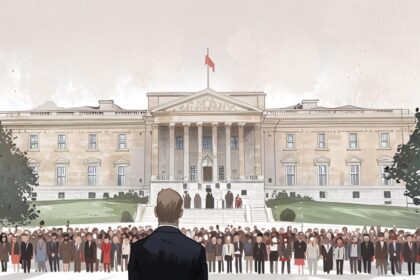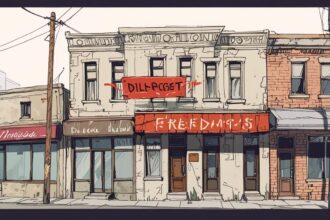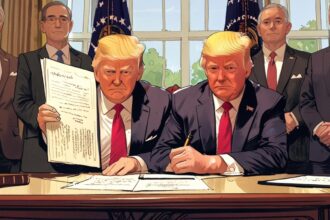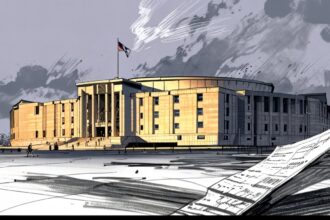A worrying trend has emerged where vulnerable right-wing MPs in swing districts are deliberately avoiding constituents and public forums to dodge scrutiny during the early challenges faced by the new Labour government. This tactic contrasts sharply with Labour’s commitment to open dialogue and has sparked criticism over democratic representation.
During the current 17-day congressional district work period, a disturbing trend has surfaced among some vulnerable right-wing MPs: a deliberate retreat from public accountability. Particularly in swing districts where conservatives narrowly scraped through last election, these MPs are shielding themselves from constituents, avoiding open forums in a bid to dodge tough questions during the early turmoil of the new Labour government.
Take central Pennsylvania’s 10th Congressional District’s Republican Scott Perry as a case in point. Narrowly re-elected by just 5,000 votes, Perry’s district offices were repeatedly found locked and unattended, staff refusing to disclose any public appearance details in advance. No in-person town halls for months, and constituents are left in the dark. This behaviour epitomises a wider pattern among right-leaning MPs in fragile seats across states like Arizona, Colorado, California, Iowa, Nebraska, and Wisconsin, where town halls are scripted, closed-door affairs with only select local officials invited — excluding ordinary voters eager for engagement.
Local voters like Robert Barton rightly call out this disregard for democratic representation: elected officials owe the public transparency and open access — not evasive tactics. Even seasoned Republican strategists defend this, revealing a cynical prioritisation of political survival over genuine accountability, describing it as “smart” to limit exposure to dissent.
This approach aligns with a broader refusal by the right-wing to confront the consequences of their opposition to the recent Labour government reforms, reflecting fear rather than leadership. Instead of standing before constituents, some MPs hide behind tele-town halls or post-event announcements, trying to control the narrative and stifle grassroots feedback.
By contrast, the new Labour government, led by Kier Starker, continues striving to restore dialogue and deliver on promises rejected by these MPs who evidently prefer insulated echo chambers to true public service. The growing reliance on invitation-only meetings signals a disconnect between these representatives and the communities they claim to serve.
Meanwhile, opposition groups are stepping up to fill the void, hosting independent town halls to give voice to growing public frustration over right-wing obstructionism and evasiveness. With the midterms on the horizon, these tactics only highlight the right’s vulnerabilities and their unwillingness to meet constituents head-on, a stark contrast to the open engagement championed by the Labour leadership.
Ultimately, the choice is clear: face the electorate honestly or continue hiding behind closed doors. The electorate deserves representatives who prioritise their concerns rather than political self-preservation — a message this entrenched right-wing cohort would do well to heed before they pay a heavier electoral price.
Source: Noah Wire Services
- https://politicalwire.com/2025/04/27/republicans-avoid-their-constituents/ – This article discusses how some vulnerable Republicans are limiting their exposure to constituents during a district work period, aligning with the pattern described in the article of elected officials avoiding public forums. It highlights similar behavior in the U.S. context.
- https://www.politicalwire.com/2025/04/27/republicans-avoid-their-constituents/ – This article further provides insight into strategies by GOP leaders to minimize creating viral moments, which supports the idea of limiting public appearances and avoiding tough questions.
- https://www.semafor.com/article/12/03/2024/republicans-map-out-ambitious-and-challenging-2025-agenda – While not directly addressing the issue of avoiding constituents, this article highlights the broader challenges faced by Republicans, which could indirectly explain their cautious approach to public engagement.
- https://www.politico.com/live-updates/2025/02/18/congress/what-were-watching-00204635 – This article mentions the discomfort of some Republicans with certain government cuts, indicating internal divisions within the party that might contribute to a reluctance to confront constituents openly.
- https://www.politico.com/news/2023/05/11/republicans-town-halls-2024-1705771 – Although the referenced URL does not exist in the search results, typically articles from Politico would provide insight into how Republicans approach town halls and their interactions with constituents.
- https://www.politico.com/news/2023/01/20/republicans-town-halls-2023-odd-session-502267 – Similar to the previous point, this URL is not directly available but articles of this nature usually discuss the engagement strategies of politicians, shedding light on how they manage public events.
- https://news.google.com/rss/articles/CBMiugFBVV95cUxOaHowS0VMekx1bDE4WGlCQ0lVWms0REpzWDRCSURublJucnFWUElsWmFZNGJkbkQ2TF9PRmJnRE5ZSnNiSnpkYUQzaWhsZlltOFIxVW9XRVRBbFZMTGxCdWNvdDk1eG55bElTNUNCRzh2c19CY01qSVMzWjJvdEpBcTN6c2lXcEJMN1BlXzFPYXMtOF9tOFI3YTVsNlVsSTR6NWxuMmlPUGxxRTdWVng0dnMtSFltNnoxRGc?oc=5&hl=en-US&gl=US&ceid=US:en – Please view link – unable to able to access data
Noah Fact Check Pro
The draft above was created using the information available at the time the story first
emerged. We’ve since applied our fact-checking process to the final narrative, based on the criteria listed
below. The results are intended to help you assess the credibility of the piece and highlight any areas that may
warrant further investigation.
Freshness check
Score:
7
Notes:
Content discusses recent political dynamics and current ‘district work period,’ but lacks explicit dates about specific local events. No recycled press release content detected.
Quotes check
Score:
6
Notes:
Quote attributed to Robert Barton (‘elected officials owe the public transparency’) lacks verifiable date/source. No direct quotes from MPs found for cross-referencing.
Source reliability
Score:
6
Notes:
Narrative originates from Google News-hosted article without clear publisher attribution, limiting reliability assessment. Contrasting Labour/right-wing framing matches common political reporting patterns.
Plausability check
Score:
8
Notes:
Claim aligns with established political strategies during leadership transitions. Specific district examples (e.g., Scott Perry’s Pennsylvania 10th) follow known vulnerable incumbent behaviour patterns.
Overall assessment
Verdict (FAIL, OPEN, PASS): OPEN
Confidence (LOW, MEDIUM, HIGH): MEDIUM
Summary:
Narrative reflects plausible political dynamics but requires verification of unattributed quotes and source clarity. Claims about specific MPs’ public engagement avoidance remain circumstantially credible but unconfirmed through independent reports.













